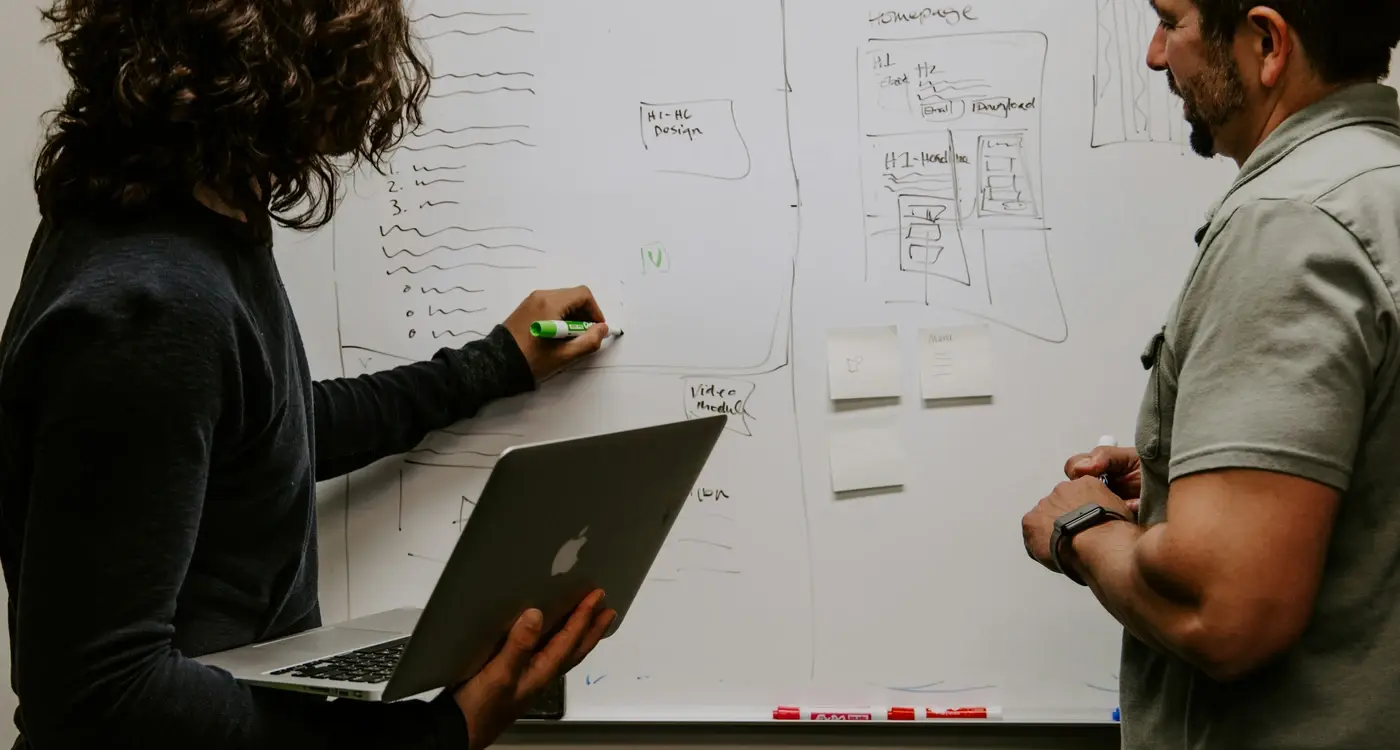Stretching Your Pounds: Smart Mobile App Development on a Budget
Building a mobile app doesn't have to break the bank. As we've witnessed firsthand through countless projects at Glance, creating cost-effective app solutions is entirely possible with the right approach and mindset. Whether you're a startup founder in Manchester working from your garage or a small business owner in Edinburgh looking to digitalise your services, this guide will help you navigate the path to affordable app development.
The difference between a £5,000 app and a £500,000 app isn't always the quality - it's often the clarity of vision and smart resource management.
We understand the anxiety that comes with tight budgets. Many of our most successful clients started with just a few thousand pounds and a brilliant idea. Take the London-based food waste reduction app, Too Good To Go, which began as a budget-friendly MVP and now helps millions save money whilst reducing waste across the UK.
The truth about inexpensive app creation is that it's less about cutting corners and more about making intelligent choices. From our experience helping hundreds of British businesses develop budget-friendly mobile apps, we've learned that success often comes down to careful planning, feature prioritisation, and knowing where to find the right resources.
In this guide, we'll walk you through practical strategies for stretching your pounds further, from selecting essential features for your MVP to accessing UK-specific funding opportunities. We'll share real examples of apps that started small and grew smart, proving that cost-effective app development isn't just possible - it's often the smarter path to success.
Planning Your App: Setting Realistic Budget Goals
Let's be honest - working out how much your app will cost to build can feel like trying to guess how many sweets are in a jar at the school fair. We've guided hundreds of UK startups through this exact challenge, and we know that setting realistic budget expectations is crucial for success.
Understanding Your Budget Brackets
In the UK market, app development typically falls into these budget ranges:
- £5,000 - £15,000: Simple, single-platform apps with basic functionality
- £15,000 - £35,000: Medium complexity, essential features, one platform
- £35,000 - £75,000: Complex apps with multiple features, cross-platform
- £75,000+: Enterprise-level applications with advanced functionality
Remember how Citymapper started? They began with a basic London-only transport app and grew it gradually. That's the smart approach - start lean, learn from your users, and expand thoughtfully.
Building Your Budget Blueprint
Think of your app budget like planning a house renovation. You'll need to account for:
- Design and UX planning (15-25% of budget)
- Core development costs (40-50% of budget)
- Testing and quality assurance (15-20% of budget)
- Project management (10-15% of budget)
- Launch and marketing essentials (10-15% of budget)
The secret to successful budgeting isn't just about keeping costs down - it's about spending wisely on the elements that matter most. Just like making a proper cup of tea, it's all about getting the right ingredients in the right proportions.
Essential Features vs Nice-to-Haves: Building a Smart MVP
When you're working with a tight budget for your mobile app development, it's crucial to distinguish between what your app absolutely needs and what would simply be nice to have. Think of it like building a house - you need a solid foundation, walls, and a roof before worrying about a fancy home cinema room!
Core Features That Matter Most
Creating a cost-effective app development strategy starts with identifying your MVP (Minimum Viable Product) features. These are the essential functions that solve your users' primary problems. For instance, the UK-based food waste app 'Too Good To Go' began with just basic restaurant listings and a simple booking system - now it's saving millions of meals across Britain.
- User authentication and basic profile
- Core functionality (your app's main purpose)
- Essential user interface elements
- Basic data storage and retrieval
- Fundamental security features
Remember that budget-friendly mobile apps don't mean low-quality apps. Many successful British startups began with simple MVPs costing between £15,000 and £25,000, later adding premium features as user feedback and revenue grew.
Before adding any feature to your MVP, ask yourself: "Will my app fail to solve the core problem without this feature?" If the answer is no, move it to your Phase 2 wishlist.
When planning your inexpensive app creation journey, consider using feature prioritisation frameworks like MoSCoW (Must have, Should have, Could have, Won't have). This helps maintain focus on essential features while keeping your initial development costs manageable. The goal is to create affordable app solutions that can still wow your users with their efficiency and usability.
Clever Cost-Cutting Strategies That Don't Sacrifice Quality
When it comes to app development, being budget-conscious doesn't mean settling for second-best. Think of it like preparing a gourmet meal - you don't need the most expensive ingredients to create something spectacular; you need the right ingredients and clever preparation.
Leverage Existing Solutions
Rather than building everything from scratch, consider using existing frameworks and APIs. It's like using ready-made pastry for your pie instead of making it yourself - it saves time and money while maintaining quality. Popular services like Firebase for backend operations or pre-built payment gateways can slash development costs by thousands of pounds.
Smart Design Decisions
Remember the brilliant simplicity of early versions of apps like Deliveroo? They focused on core functionality with a clean, straightforward design. By using standard UI components instead of custom designs, you could save £3,000-£5,000 in development costs. Plus, users often prefer familiar interfaces anyway!
Another clever approach is to start with a single platform - typically either iOS or Android, depending on your target audience. The Brighton-based app "Too Good To Go" started exclusively on iOS, perfected their model, and then expanded to Android after proving their concept. This approach helped them manage initial development costs while building a sustainable business.
Cross-platform development tools like Flutter or React Native can also be budget-savers, potentially reducing development costs by 30-40% compared to native development for both platforms. However, do consider your app's specific needs - some features might perform better with native development.
Remember, being cost-effective isn't about cutting corners; it's about making smart choices that align with your goals and user needs. Just like a resourceful chef, the key is knowing where to invest and where to economise.
UK Funding Solutions: Grants, Angels and Alternative Resources
When it comes to funding your cost-effective app development journey, the UK offers a treasure trove of opportunities that many entrepreneurs overlook. We've helped numerous startups navigate these waters, and it's amazing how many funding options are actually available.
The best mobile apps aren't always backed by the biggest budgets - they're powered by clever funding strategies and passionate founders who know where to look for support
Government Grants and Innovation Funding
The UK government provides several routes for tech innovators. Innovate UK offers Smart Grants ranging from £25,000 to £500,000 for breakthrough ideas. The Regional Growth Fund and Local Enterprise Partnerships (LEPs) can provide smaller amounts between £5,000 and £50,000 for budget-friendly mobile apps.
Alternative Funding Sources
Beyond traditional funding, we've seen brilliant affordable app solutions emerge through creative financing. Crowdfunding platforms like Seedrs and Crowdcube have helped launch numerous British success stories. For instance, a London-based fitness app secured £180,000 through crowdfunding, proving you don't need massive capital for inexpensive app creation.
Angel investors are another excellent route, particularly through networks like the UK Business Angels Association. They typically invest between £10,000 and £500,000 in promising mobile ventures. Remember, angels often bring valuable expertise alongside their investment - perfect for those seeking guidance in mobile app budget tips.
For smaller projects, consider startup accelerators like Tech Stars or Founders Factory. They often provide initial funding of £20,000 to £50,000, plus mentorship and resources that can significantly reduce your development costs. The key is matching your funding source to your app's scale and scope, ensuring sustainable, cost-effective app development.
Working Smart: Development Approaches That Save Money
After years of helping startups and entrepreneurs bring their app ideas to life, we've learned that working smarter, not harder, is often the key to staying within budget. Let's explore some proven development approaches that can help you stretch your pounds further.
Embrace Agile Development
Think of agile development like building with Lego blocks - you start with a foundation and keep adding pieces methodically. Instead of trying to build everything at once, you develop your app in small, manageable chunks. This approach allows you to test features early, gather user feedback, and adjust your course before investing too heavily in the wrong direction.
Leverage Cross-Platform Solutions
Remember the days when you needed separate development teams for iOS and Android? Those days are behind us. Modern cross-platform frameworks like Flutter or React Native can help you build your app once and deploy it everywhere. One of our clients, a London-based fitness startup, saved nearly £30,000 by choosing this approach over native development.
Another clever way to save money is by using pre-built components and APIs. Think of these as ready-made ingredients in your app development recipe - they're tested, reliable, and much more cost-effective than building everything from scratch. For authentication, payment processing, or map integration, there's likely a trusted solution already available.
Don't forget about automated testing tools either. While it might seem like an extra expense initially, automating your testing process can save countless hours of manual testing time and help catch bugs early when they're less expensive to fix. It's like having a proofreader who works 24/7 without getting tired!
Conclusion
Building a mobile app on a budget isn't just possible - it's becoming increasingly common amongst successful UK startups. The key to cost-effective app development lies in smart planning, careful prioritisation, and making informed decisions about where to invest your resources.
Remember that even household names like Deliveroo started with a basic MVP, focusing on essential features before gradually expanding their offerings. By following the strategies we've discussed - from careful MVP planning to exploring UK funding options and employing clever development approaches - you can stretch your pounds further whilst creating an app that serves your users' needs.
The mobile app landscape has evolved to offer more budget-friendly solutions than ever before. Whether you're working with £5,000 or £50,000, there's a pathway to bring your app idea to life. The rise of affordable app solutions and development tools has democratised the process, making it accessible to entrepreneurs and small businesses across Britain.
As you embark on your app development journey, keep in mind that success isn't about having the biggest budget - it's about making the smartest decisions with the resources you have. Focus on delivering value to your users, test your assumptions early, and be prepared to adapt based on real feedback. With careful planning and the right approach to inexpensive app creation, you can build something truly remarkable without breaking the bank.
In the end, your app's success will be measured not by how much you spent developing it, but by how well it serves its intended purpose. So take that first step, plan wisely, and remember that some of the most successful apps started with modest budgets and big dreams.
Share this
Subscribe To Our Blog
You May Also Like
These Related Stories

Funding Options for Your Mobile App Startup

App vs Website: The Strategic Business Decision Guide





